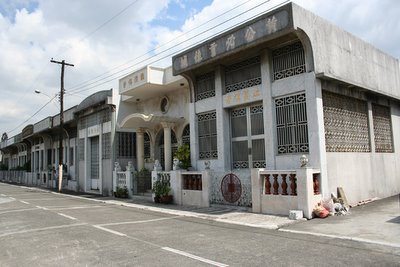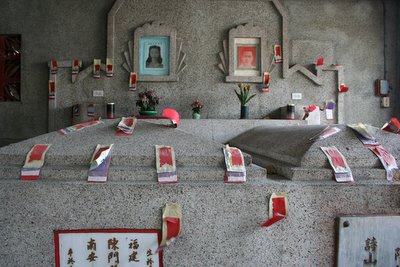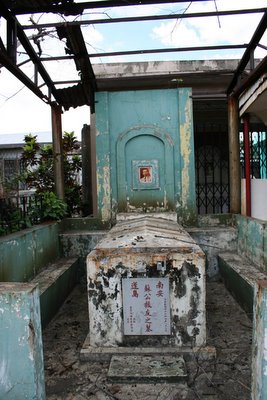Anniversary time
Glory Days, Time Asia, Feb. 27, 2006
Filipinos wonder what's changed 20 years after Marcos, AFP, Feb. 22, 2006
In 20 years since Marcos, little stability for Philippines, Washington Post, Feb. 24, 2006
Welcome to my blog! I'm an American journalist and Princeton-in-Asia fellow assigned to a TV station in Manila. I'll be here for a year and I hope to share my life and experiences in the Philippines on this site.
 The Chinese cemetery in Manila is, at the same time, fascinating and absurd. It's its own city with paved roads, small alleys, and mosoleums larger than the homes that the living of Manila inhabit. There are tombs and alters like the one above. I would consider that to be one of the more modest tributes to a former Manila resident of Chinese descent. And then there's what my fellow urban explorers and I dubbed "Main Street" -- a street lined with small mansions with air conditioning, glass windows, and well groomed yards.
The Chinese cemetery in Manila is, at the same time, fascinating and absurd. It's its own city with paved roads, small alleys, and mosoleums larger than the homes that the living of Manila inhabit. There are tombs and alters like the one above. I would consider that to be one of the more modest tributes to a former Manila resident of Chinese descent. And then there's what my fellow urban explorers and I dubbed "Main Street" -- a street lined with small mansions with air conditioning, glass windows, and well groomed yards. We found one mosoleum bigger than a large church, apparently the resting place for an entire family. Some of the graves had clearly been visited recently.
We found one mosoleum bigger than a large church, apparently the resting place for an entire family. Some of the graves had clearly been visited recently.
 Some looked forgotten -- like their families moved away long ago -- left to decay in the tropical humidity.
Some looked forgotten -- like their families moved away long ago -- left to decay in the tropical humidity.

Policies were even in place to avert a pending disaster: Area villages were evacuated late last year, and a logging ban, to address the deforestation at the root of the problem, had been adopted more than a decade ago.
But reality was another matter. According to government officials and environmental groups, problems ranging from government corruption and ineffective laws to a lack of money and the political will to enforce the laws contributed to the collapse of the mountainside here in the first instance, and allowed it to become a large-scale human tragedy in the second.
Angel, who currently has a boyfriend not working in a call center, said she herself was being courted by an older married coworker.
His wooing, she said, comes leeringly with some kind of assurance that “it’s supposedly a natural thing in call centers to have a lover while you’re inside and another one outside, both at the same time.”
“Para lang daw masaya (Just for a little happiness),” she told the Inquirer. Asked what she thought made her call center prone to such indecent overtures and liaisons, Angel said: “When you’re in one, you tend to spend more time with your coworkers than with your family or partner. You practically have a life nowhere else but there.”